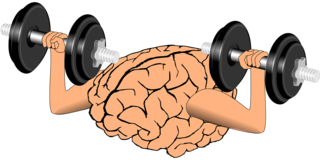Memory
Brain Training Is a Good Idea That Didn’t Work
Working memory capacity affects thinking, but training it doesn't help.
Posted January 6, 2017

It is hard to create practical applications of any science, and psychology is no exception. The field does excellent basic research to understand core aspects of behavior. That research often creates tantalizing suggestions for how to maximize people’s potential. Unfortunately, until a practical application is created, it is just not clear whether it will work.
Brain training applications are a great example of a great idea that did not pan out.
One of the central aspects of many brain training regimes focuses on working memory, which is the amount of information that someone can hold in mind at any given moment. If you are going to make a complex decision or do a difficult calculation, then you need to hold many factors in mind at once in order to take all of them into account when reasoning.
Research demonstrates that there are individual differences in working memory capacity. That is, some people are able to hold more information in mind than others. These individual differences are correlated with measures of intelligence. People with larger working memory capacities do better on intelligence tests than those with smaller working memory capacities.
That observation led to a natural practical recommendation. If we could find ways to expand people’s working memory capacity, then we should also improve their performance on a range of cognitive tasks. This proposal led to the development of many regimes for training people’s working memory capacity. In these training tasks, people practiced holding things in mind and doing tasks with that information. The hope was that this would improve functioning in brain areas critical to working memory capacity.
A paper in the July, 2016 issue of Perspectives on Psychological Science by Monica Melby-Lervag, Thomas Redic, and Charles Hulme did a meta-analysis of published studies of the effects of working memory training. A meta-analysis looks across many published studies to determine the overall influence of a treatment.
These researchers focused on studies in which one group was given working memory training for a period of time and there was a control group. A control group is a comparison group of people who do not get the treatment of interest. The researchers point out that there are two kinds of control groups. Some control groups are untreated. Others undergo a different treatment than the one being studied. Treated control groups are important, because there can be placebo effects even in cognitive training. Just believing that you have done something that is going to improve your mental functioning may improve your performance on later tasks.
The meta-analysis addressed two questions. First, did working memory training improve performance on working memory tests in general? Second, did working memory training improve performance on cognitive tasks more broadly.
The results were quite clear. Working memory training did improve performance on related working memory tests for a short period of time, but those improvements did not last. There was no evidence that working memory tests improved performance on other tests of cognitive performance like reasoning tasks or reading comprehension tasks.
There were some early studies that suggested working memory training might have a broader impact on mental performance, but these studies tended to use untreated control groups. Thus, the findings may have been placebo effects rather than demonstrations that working memory training is truly effective.
It is worth thinking about why working memory training did not have a significant influence on performance. One possibility is that working memory capacity is just really hard to improve. It may be that working memory is a core aspect of people’s cognitive architecture, and that it is not something that simple behavioral training for several weeks can affect.
Another possibility is that working memory capacity can be improved to some degree, but that it is hard to coordinate these improvements with other aspects of people’s mental architecture in ways that lead to good performance. That is, good cognitive performance is not just about the raw materials of the brain that we use to think. It is also about the coordination among regions of the brain that serve up the information that is needed exactly when it is required. Even if brain training does lead to some improvements in working memory capacity, it may not do so in a way that coordinates those improvements with the rest of what the brain is doing in ways that would make people perform more effectively in general.
Ultimately, the most effective thinkers are the ones who have the best knowledge. Rather than spending time on tasks designed to improve elements of the mental architecture, it is better to spend time learning new things that may be useful in the future.
Follow me on Twitter and on Facebook and Google+.
Check out the Two Guys on Your Head book, Brain Briefs, and my books Smart Thinking, Smart Change and Habits of Leadership
Listen to my radio show on KUT radio in Austin, Two Guys on Your Head, and follow 2GoYH on Twitter and Facebook. The show is available on iTunes and Stitcher.
References
Melby-Lervag, M., Redick, T.S., & Hulme, C. (2016). Working memory training does not improve performance on measures of "far transfer": Evidence from a meta-analytic review. Perspectives on Psychological Science, 11(4), 512-534.




